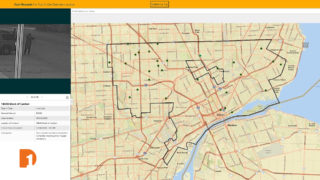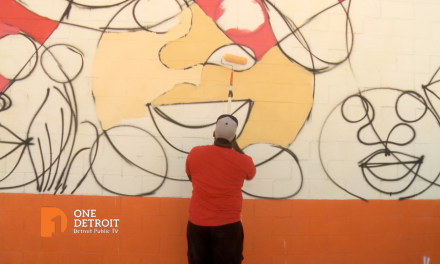The Detroit Police Department and Crime Stoppers of Michigan have a new weapon to help them close investigations and solve crimes. The two organization’s new TV show and web program, Detroit Rewards TV, plans to get Detroit residents involved by rewarding them up to $1,000 for anonymously reporting tips that help solve a criminal investigation. The goal, the Detroit Police Department says, is to encourage citizens to speak up if they have information about a crime.
 RELATED: BridgeDetroit | Will a New Television Show Help Reduce Crime in Detroit?
RELATED: BridgeDetroit | Will a New Television Show Help Reduce Crime in Detroit?
One Detroit’s Will Glover sits down with BridgeDetroit reporter Bryce Huffman to talk about the possible positives and consequential problems that could come from the new Detroit Rewards TV program.
Full Transcript:
Will Glover: We have ShotSpotter, we’ve talked about facial recognition. We’ve talked about Project Greenlight, and now we have Detroit Rewards TV.
Bryce Huffman, Reporter, BridgeDetroit: Yeah. So to give the brief summary, Detroit Rewards TV is, the name is a little bit misleading because it’s not just a TV show, but it’s a website and a TV program that gives information on ongoing, you know, Detroit police investigations. And it gives people the chance to earn money by providing tips to the police.
Bryce Huffman: And they do that by actually providing the tips to Crime Stoppers of Michigan. They’re a nonprofit that’s been working with the police department for nearly 30 years on getting people to provide information on cases.
Will Glover: What was the deciding factor or what pushed DPD to allocate resources financial resources to this Detroit rewards TV program?q
Bryce Huffman: I think DPD realized a while ago that they’re best at solving crimes when they have the support and the help of the community, and Crimestoppers of Michigan has been helping them get information on cases for a long time now so that part of it isn’t necessarily new. But I think the department, they wanted to reach people where they’re at, and they figured if we give them a TV program that they can tune in to regularly and see information about the cases that we’re looking for info on or if they can go to our website and just see, okay, these are the kinds of cases that we’re trying to solve right now. Do you know anything about them?
Bryce Huffman: It gives the community kind of a chance to weigh in on and provide input on cases that are actually happening in their community. And I think that’s one of the things DPD really been trying to focus on in the past couple of years is making residents understand that, you know, the fight against violent crime is something that it’s not just the police. It’s not just the criminals. It’s everyone in between.
Will Glover: Is there any evidence that programs like these actually help solve crimes? Does it help reduce crime rates? What is the outcome of stuff like this, or do we know yet?
Bryce Huffman: We don’t know yet. And I think that’s like the short, easy answer. We do know that the department did look at some examples from other cities to see, all right, how do these rewards programs typically work? Detroit kind of did their own thing, you know, with having a TV program and a website, they kind of decided we’re going to do it a little bit differently than we’ve seen it done before. Just so, you know, it kind of has our own unique spin on it.
Bryce Huffman: So we don’t know exactly how it will work here. But the chief and other people in the department are really happy with the idea that people in the community who have been fed up with crime rates and with shootings and carjackings in their area can now, you know, directly help the police solve those issues.
Will Glover: Is it a concern that majority of the people who are on the website are African-American young men? And the photos aren’t always the clearest because they’re usually security camera photos? Have they expressed any concern about misidentification or over-policing or any of the ancillary things that go along with posting people’s faces, potential criminals’ faces along with, you know, a dollar amount for what’s essentially a, you know, almost a bounty?
Bryce Huffman: Yeah, the department hasn’t expressed any concern about that. That’s something that me as a reporter who’s been critical of the department has a little bit of concern about because there is the financial incentive to report things now. But again, it’s one of those. It’s too soon to tell things. You know, I could personally see some bad things happening with it.
Bryce Huffman: I could see some misidentification being a possibility, just like with facial recognition. But I think the department has policies in place that at the very least if someone is misidentified, it wouldn’t necessarily lead directly to a wrongful arrest.
Will Glover: Do you think that this is a worthwhile endeavor, or do you think that maybe the efforts should be put more toward the image of police to get more people to want to cooperate? Is there a better way or a better thing that they could be focusing on right now?
Bryce Huffman: This maneuver, this initiative kind of signals to me that they do want to work with the community and they do want residents to, you know, feel comfortable reporting things that they know are happening that are wrong. And I don’t have any problems with that part of it. I think the thing to be careful of is to not just spread traumatic black stories for the sake of spreading traumatic stories.
Bryce Huffman: And, you know, luckily for me, I do get the sense that they’re spreading these stories because they’re trying to get help solving these crimes and bring closure to families. It doesn’t necessarily come off as though they’re sensationalizing black trauma just for the sake of doing it.
Will Glover: What are some of the things that you will be keeping an eye on as we learn more about the program as it develops?
Bryce Huffman: So you kind of hit on it earlier. I’ll be looking out for things like wrongful arrests. I’ll be looking out for some of the, you know, like you said, there’s a dollar amount next to these pictures. You know, does that wrongfully incentivize people to report things that might not actually be violent crimes or might not be that serious type of crime just for the reward money?
Bryce Huffman: As with any system where money is involved, you know, people might try to corrupt it. So I’ll be looking out for those kinds of things as like on a watchdog level. But for the time being, you know, everyone in the department seems really excited about it. Crimestoppers seems really excited about it. So we’ll just keep an eye out and see if it goes well or it doesn’t go well.
Subscribe to One Detroit’s YouTube Channel & Don’t miss One Detroit Mondays and Thursdays at 7:30 p.m. on Detroit Public TV, WTVS-Channel 56.
Catch the daily conversations on our website, Facebook, Twitter @DPTVOneDetroit, and Instagram @One.Detroit
View Past Episodes >
Watch One Detroit every Monday and Thursday at 7:30 p.m. ET on Detroit Public TV on Detroit Public TV, WTVS-Channel 56.




